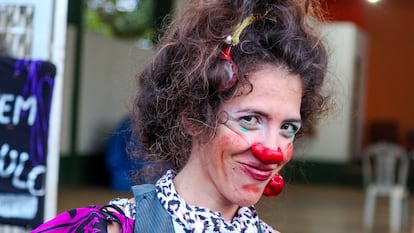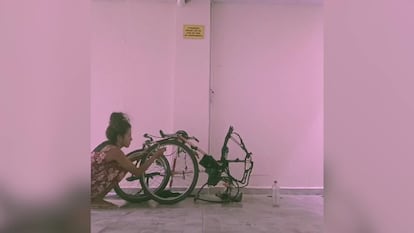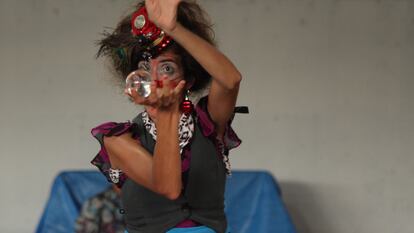The cruel femicide of a traveling clown in Brazil
The death of a Venezuelan artist rekindles the debate on gender-based violence and puts the spotlight on the challenges facing street performers


Julieta Hernández Martínez, 38, was a street performer, a clown, a nomad who had spent years cycling through Brazil to stage her solo circus and puppet show in town and city squares. When she morphed into Miss Jujuba, she donned a red nose and played the cuatro, a guitar typical of her native Venezuela. On December 23, when she was pedaling through the Amazon en route to a long-awaited meeting with her mother on the other side of the border, she disappeared. A group of Brazilian circus professionals, small but organized, raised the alarm. In January, her bicycle was found. Then her body. A Brazilian couple running a cheap hostel stole Hernández’s new cell phone before the man raped her and the woman burned her body.
One of more than 1,300 yearly femicides in Brazil, Hernández’s murder triggered an unprecedented wave of indignation and solidarity. Last weekend, more than 130 Brazilian cities hosted bicycle protests and marches to pay homage to the life and work of Miss Jujuba and condemn chronic male violence.

“Juli was my role model because of her courage, because she was a one-woman show, because being on the street alone is very hard, and because she had many artistic talents and combined them in her travel project,” says her Brazilian friend Luiza Soares Cabral, 36, who is also an itinerant clown. Soares tells EL PAÍS that they met in a WhatsApp support group of circus women that emerged during the pandemic. They talked about the profession, and the challenges of being a street artist. “We connected right away,” says Soares. “Juli had cycled out of Rio de Janeiro to the northeast of Brazil in 2019. And I was going out in the same direction by van with my little troupe, Circo Muamba — that is really my family — my partner and our daughter.”
The circumstances of the murder and the reaction to it have put gender-based violence and the dangers female lone travelers face back on the map while also offering insight into the otherwise little known universe of itinerant circus professionals. Clowns, puppeteers and street artists in general choose a nomadic lifestyle with performances in distant cities, towns and villages, often convinced that their art is an instrument of social change. Who knows if any of them have left a mark as deep as the one left on Colonel Aureliano Buendía by gypsies in One Hundred Years of Solitude the day he was first introduced to ice.
Miss Jujuba lived and traveled on two wheels, carrying with her the bare essentials. Thanks to a fundraiser online, she had just bought a new cell phone. A decent cell phone is crucial to a travelling clown’s success in the 21st century, as it is as important for street artists to have access to electronic payment facilities as it is to pass the hat around for loose change, not to mention the importance of having active social media accounts with recordings of their performances.
A few days before she disappeared, Hernández posted a video on Instagram titled ¡Gracias! In it, she addressed the public in Portuguese as “those who believe in my work, my artistic endeavor, my life project” and thanked them for the donations that helped her buy the cell phone. She knew that she would be able to promote her art more effectively with her new phone, and added a postscript: “I’ve always wanted to make speeded up videos, a classic of travelers on bikes, haha.”
She posted her last message on December 23 from a city eight hours by bike from Manaus called Presidente Figueiredo. She said she would spend the night there before heading north to Puerto Ordaz in Venezuela, where she grew up. After being turned away from two hostels, she found a third with a free bed for $2. She was the only guest besides a couple who had been there for seven months with their five children in exchange for looking after the place.
Hernández’s colleague and friend Soares says that nomads like them work on a scale of risk when deciding where to spend the night. “If there are only men, it is dangerous; a man with a female companion, less dangerous; a family, even if it is dysfunctional, is safer. I am convinced that Juli thought that, as there were five children, it was a safe space.”
After the arrest and confession of the suspects, police commissioner Valdinei Silva revealed details of the crime: “The victim was sleeping in a hammock on the balcony of the hostel, when Thiago grabbed a knife and approached her to steal her cell phone.” She was hanged, raped, burned, hanged again and buried nearby. The killers are in prison on charges of robbery, rape, murder and concealment of a corpse.
Brazilian philosopher Djamila Ribeiro has written in the daily Brazilian newspaper Folha that this murder is “a painful reminder of the long-standing lack of freedom for women, who must think and pray when they decide to travel alone. What should be a right for all of us is an unacceptable matter of luck. Luck you don’t run into aggressors.” Miss Jujuba herself admitted some time ago in an interview posted on YouTube that what she liked most and also least about her lifestyle were the uncertainty and the people. “Of course you’re scared, but you feel brave,” she said.
The Venezuelan artist, who studied veterinary medicine, arrived in Brazil in 2016 to study theater. As a solitary traveler with extensive experience, she would make sure to tell people when she knew she was going to be offline or lacking phone coverage while crossing a vast country where coverage and Wi-Fi are scarce. But when the days of silence dragged on, her friends feared that she had had an accident.
They tried to report her disappearance, but there was no way to do it from afar, so several artist collectives such as Circo di Só Ladies, Pé Vermei, Circo Muamba and three others, launched the #JulietaPresente campaign online to raise the money to send someone to Presidente Figueiredo to report her disappearance and search for clues on the ground. In a short time, they raised enough donations for three clowns and Hernández’s mother to travel. Only then did the police take action; within two days, they had the murder solved. The media quickly climbed on board.

Soares explains that, while popular, there is also a stigma attached to street art. “People think we do this because we’re desperate for money,” she says. “But, besides being a lifestyle choice, it is an ideological project.” The victim’s friends point out in an open letter that street art, traveling by bike and migration were the trenches from which Miss Jujuba fought “the capitalist, patriarchal and oppressive system.”
Soares says that she last spoke to her friend on December 22, the day before the murder. She also says that they weren’t seeing much of each other at that point, as both were on tour in Brazil, each with their own show and trajectory. Their paths finally crossed at an artistic festival held in Ingazeira, in the interior of the state of Pernambuco. “Our approach to travelling was peer-to-peer exchange,” she says. “We would come to a city to leave our art and feed off the local art.”
Troupes of traveling performers are a long-established phenomenon in Latin America, and itinerant street artists are in constant contact with each other. They share information about routes, hostels, support points, and recommend cities where they have done well and advise against those that have posed problems. Whether because of its history, its ethnic diversity, its size or a climate that favors street life, Brazil possesses a cultural richness that is truly overwhelming.
Like an ant, treading her way through a territory twice the size of the European Union, Hernández had been immersed for years in street art. “She was on the lookout for seamstresses, artisans who make instruments and wooden dolls,” says Soares. “She immersed herself in local folklore, shared knowledge with artists who often don’t even perceive themselves as artists. And she offered puppet workshops, wrote, and drew. Sometimes she stayed in one place for months.” Her next project was to learn how to better share her knowledge with a wider audience.
Julieta Hernández Martínez, aka Miss Jujuba, is now buried in Venezuela. Her friends, the circus nomads, are still in shock and aware that it could have happened to any of them. They are still looking for Miss Jujuba’s bag of tricks: the puppets, the drawings, the writings. Her Instagram account @utopiamaceradaenchocolate displays a small selection of her art.
Sign up for our weekly newsletter to get more English-language news coverage from EL PAÍS USA Edition
Tu suscripción se está usando en otro dispositivo
¿Quieres añadir otro usuario a tu suscripción?
Si continúas leyendo en este dispositivo, no se podrá leer en el otro.
FlechaTu suscripción se está usando en otro dispositivo y solo puedes acceder a EL PAÍS desde un dispositivo a la vez.
Si quieres compartir tu cuenta, cambia tu suscripción a la modalidad Premium, así podrás añadir otro usuario. Cada uno accederá con su propia cuenta de email, lo que os permitirá personalizar vuestra experiencia en EL PAÍS.
¿Tienes una suscripción de empresa? Accede aquí para contratar más cuentas.
En el caso de no saber quién está usando tu cuenta, te recomendamos cambiar tu contraseña aquí.
Si decides continuar compartiendo tu cuenta, este mensaje se mostrará en tu dispositivo y en el de la otra persona que está usando tu cuenta de forma indefinida, afectando a tu experiencia de lectura. Puedes consultar aquí los términos y condiciones de la suscripción digital.








































